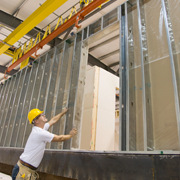A growing number of companies in the UK are turning to modular building to speed up the pace of construction.
 Unlike traditional builds, modular homes and offices are created off-site then delivered to the desired location to be erected. Often quicker to construct – a recent McKinsey report found modular construction can shrink schedules by as much as 50% – and created to bespoke specifications, they’re also typically cheaper and more environmentally friendly.
Unlike traditional builds, modular homes and offices are created off-site then delivered to the desired location to be erected. Often quicker to construct – a recent McKinsey report found modular construction can shrink schedules by as much as 50% – and created to bespoke specifications, they’re also typically cheaper and more environmentally friendly.
Some modular construction companies even use designs that can be transported flat-packed in standard shipping containers. This means these ingenious kits can be moved on-site in regular lorries and come in pieces that are simple to put together.
Show all Construction/Trades jobs across Scotland
In the UK right now, the downturn in traditional building manufacturing output – largely fuelled by Brexit fears and global economic concerns – has further buoyed the modular building movement.
One company in Yorkshire is currently creating jobs and bringing investment to the region through a new £500 million modular building initiative.
Integra Buildings – which designs and constructs buildings off-site before delivering and installing them – has been named as a supplier for the Government’s newly launched Modular Buildings Solutions framework.
The four-year drive has been launched by Crown Commercial Service, a government body that helps the public sector achieve maximum commercial value when procuring goods and services.
Integra’s directors say its projects will create 10 jobs over the next 12 months and support investment of up to £1 million in production facilities in Paull near Hull.
Managing Director Gary Parker said: “The Government is making a very serious commitment to modular building and being named on the framework is massive for us. At a time when all businesses are having to deal with uncertainty, this will give us the confidence to create new jobs and invest in our people and facilities because of the potential value of the work.
“In our fast-growing industry, it’s vital to keep investing in people and technology.”
With off-site manufacturing on the rise so, too, are job opportunities. So, let’s take a look inside the box and discover what you can expect from a career in this innovative sector.
If you’re coming to the modular building trade for the first time, you can start out as a construction operative. Working in a factory setting, construction operatives enjoy niche roles such as steel fixer, welding fabricator, stonemason or joiner.
Typically multi-skilled, you’ll be expected to perform a variety of duties within this environment but knowledge of and a competence with machinery, strong team-working talents and the ability to meet strict deadlines are all crucial.
If you’ve a head for figures, the role of estimator could be a perfect fit. As part of the production planning team, your work will be key in ensuring the entire build process sticks to the precise budget agreed with the client.
This means researching the best prices for raw materials, obtaining a variety of quotes from contractors and finding workaround solutions to financial limitations – before factoring in all of the potential costs, including transportation of the components and the hiring of specialist equipment.
When it comes to the actual off-site construction, it’s the job of the structural engineer to ensure designs for every component of the building can be stored, transported and lifted to the designated site safely for assembly.
In this role you’ll also be tasked with making accurate predictions regarding how the build will react to different environmental conditions and, therefore, be able to recommend the appropriate materials to be used for each and every piece of the jigsaw puzzle.
If you have experience as a manager in the building trade but you’re looking for a new role, you might want to consider migrating your on-site skills to an off-site role.
Experience in the modular building trade isn’t a must-have as many of the skills are the same – such as having an eye for detail and the ability to plan ahead, to allocate tasks to the right people, to delegate responsibilities and show a natural talent for problem solving.
Of course, at some point the new home or office is going to have to be moved from the factory to its final destination.
This is where logistics staff ensure the transition is smooth – all the way from design to delivery, you’ll make sure all of the components are sent off safely and the most efficient transportation is used to deliver them to the site. The precise nature of modular building also means it’s crucial the right parts arrive in the right order and at the right time so you’ll also be responsible for coordinating component deliveries to ensure super-efficiency when it comes to the final assembly.
Associated roles in logistics include dispatch manager, crane operator, forklift driver and HGV driver.
From managers to movers, there’s certainly no shortage of jobs in the modular building sub-sector. So, if you’re searching for a new career in construction, why not move your focus off-site? For all the latest vacancies check out s1jobs .

